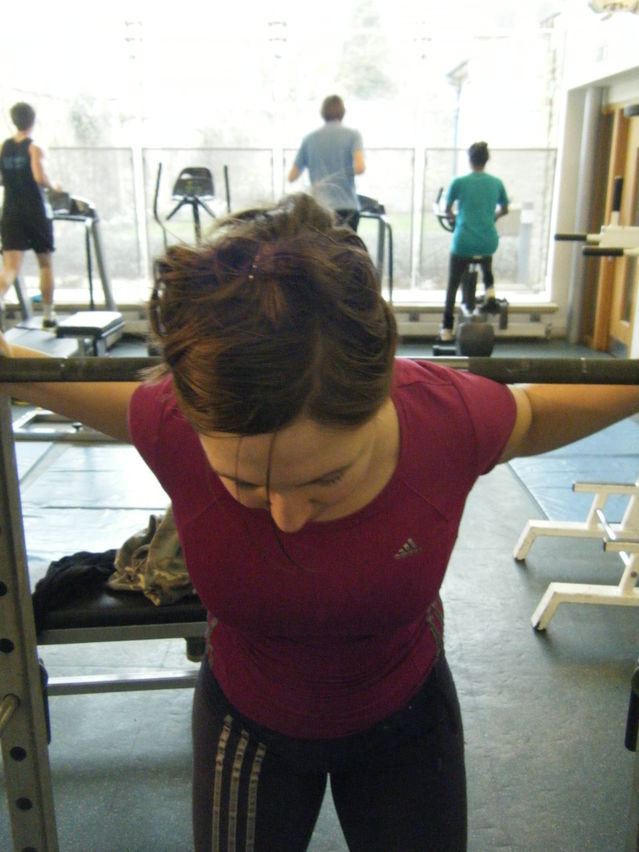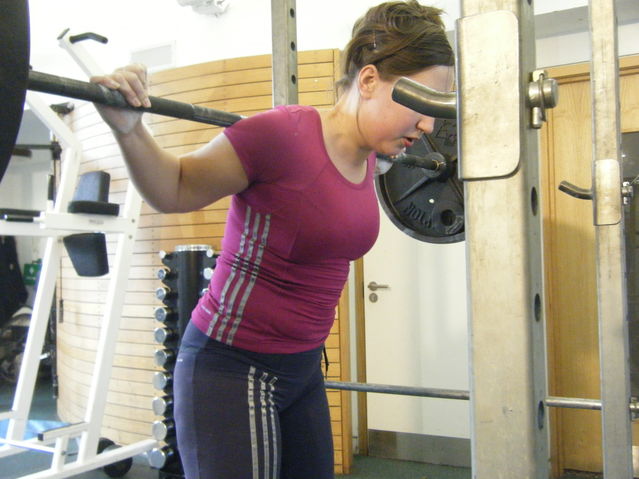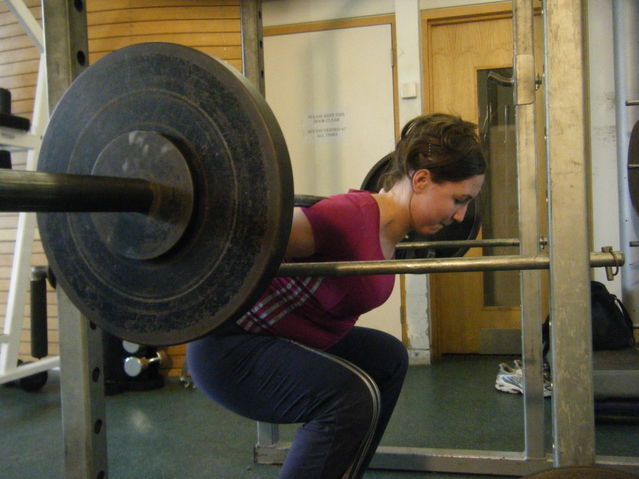Anorexia Nervosa
What Powerlifting Can Do for a Former Anorexic
Swapping starving for strength training
Posted January 24, 2011
I go to the gym three times a week - and I look forward to it!
It still amazes me sometimes, that I should have found not only a physical activity that doesn't fill me with boredom or dread (as all the ghastly team games at school used to), but also one that involves going to a gym, one of the human inventions I used to despise even more than most others. I despised a lot of things, and a lot of people, during my anorexic years, but gyms seemed to me the epitome of modern madness: that people could pay quite large amounts of money for the privilege of being able to expend energy completely pointlessly in the proximity of lots of other people either unfit or freakishly fit, with not even the benefits of daylight and fresh air to recommend it, and using their exertions on the treadmill or the resistance machines to earn their post-workout indulgence in food or drink. It still does sadden me a little to think of all the time and physical energy being thrown away in gyms all around the world, rather than being used in some more creative, philanthropic, or in other sense productive way -- and I admit to still despising those people who drive there in their 4X4s -- and I still find the cardio machines an incomprehensible substitute for walking or cycling out in the real world, even though I'm also baffled by the misery of joggers ruining their knees -- but perhaps all that simply means I'm not quite better yet.

What I love in the gym doesn't feel as wholly negative as the endeavours of those who run or pedal on the spot for hours on end, purely to see the calories-burned indicator go up and up, purely to lose weight or grow slimmer. I lift weights -- and this feels like something positive, because muscle and strength are being noticeably built, rather than fat or energy simply being lost.
My boyfriend introduced me to what had for years been his own sport of choice, without little hope of my taking to it, I think. But somehow, from the outset, it seemed right. I found I could lift the bars and dumbbells in the ways that he showed me, and I found a beautiful sense of the cleanness of the movements involved, the pure arc of weights and limbs and muscles moving in highly co-ordinated synchrony, which satisfied something in me I hadn't known existed before.
I've been aware that the metaphors that naturally come to me in characterising this pleasure are ones with an inglorious history for me and anyone who's known anorexia: purity, cleanliness, simplicity, and their conceptual connections with strength, self-control, and will-power are pernicious webs of association that need dismantling if recovery is to be complete, and which need defending against if health is to be safeguarded. But I do think the difference in context makes the resemblance only a superficial one.
In the case of anorexia, it doesn't take much insight to see the illusory nature of the associations: there's nothing inherently clean, pure, or simple, about eating too little to support a healthy body, and there's nothing inherently strong, wilful, or self-controlled about not being able to stop starving oneself despite feeling the havoc it's wreaking on one's body, mind, and life in general. Purity, simplicity, and strength are the last attributes that can be properly applied to minute rules about numbers of grams of permitted foods, or to feverish concern with bowel movements and the prominence of certain bones, or to the freezing cold, the muscle wastage and organ shrinkage, the oedema and amenorrhoea and lanugo, that often come to define the anorexic body.
With lifting it's different. The clean lines of the squat or the shoulder press induce an aesthetic response to their beauty when properly executed; the sensation of certain muscle groups pushing against a certain amount of weight is simple and, when completed, delightful; the possibility for making continuous progress is mentally satisfying. I do worry, sometimes, about some other aspects of my liking for this sport -- though much of that worry may be born of simple incredulity that I can enjoy a sport this much.
Firstly, there's the danger of its becoming something compulsive rather than merely pleasurable. Many men and women who lift weights do so for aesthetic reasons, to gain muscle mass as an end in itself, rather than to improve muscle function for strength. They tweak muscle growth in minute ways through exercises that have no real effect on strength, and reduce body fat as much as possible to make their large but inefficient muscles maximally visible.
(Just to clarify the terminology: these people are typically body-building [following high-volume, low-intensity programmes which typically combine compound lifts with resistance machines] rather than weightlifting [involving the two Olympic lifts: the clean and jerk and the snatch] or powerlifting [the back squat, deadlift, and bench press]. We're currently following Mark Rippetoe's Starting Strength programme, a mixture of mostly powerlifting and a bit of Olympic [i.e. power cleans], so what we're doing might best be called ‘strength-training'.)
There are plenty of obsessive bodybuilders, and my boyfriend was, in the past, one of them: he tailored his diet to what the T-Nation gurus recommended, imported expensive protein powders, and believed all that was his means to achieving the nirvana of having a six-pack, and the personal happiness to which that would inevitably lead. The start of our relationship put an end to that, in part because he understood how effectively those kinds of food-related obsession would prevent my being happy with him and able to recover fully.
And because he was so starved (in his careful, scientific way that nonetheless bore so many resemblances to my more obviously pathological way), it didn't take much for him to embark on a phase of eating too much -- from which he then learned, along with me, the importance of finding a middle path. The two of us have discussed the balance that needs to be struck between living such that the lifting can be fulfilling (eating more at certain times, not drinking alcohol at certain times), and living such that the rest of life is fulfilling too -- such that we can be spontaneous in social contexts, and enjoy food as more than a fuel for lifting. We've compromised: I've started drinking a protein shake most afternoons, in addition to my usual tea-time biscuits, and having egg in my porridge on workout days, and he's practised not imposing the requirements of the strength-trainer on our lives much more than that. I struggled a bit initially to add a banana before we set off for the gym, but I've noticed how it helps, and now the reasons for doing so win out in the little internal argument that is initiated by the knowledge that it's not long since breakfast, and the feeling that I don't really need it.

Some would argue that starting strength training is a silly thing for an only recently recovered anorexic to do. Eating disorders often go hand in hand with exercise obsessions, and the only reason that for me the latter was never a great problem was that work mattered more to me than losing more weight -- or at least, the proof of my power was the flawless balancing of the two. This meant that I didn't spend hours exercising, because for me they'd have been hours that should have been spent thinking, reading, and writing.
Now that my need to work every waking hour has grown gentler, I might in theory be more susceptible to the feeling that I could compensate for more food with more exercise. But I know that this isn't the case. I simply don't think that way any more, and have little fear that I'll ever do so again. For another thing, the three workouts a week don't offer much scope for a growing obsession: I can feel my muscles worn out by the time we've finished, and needing the two or three days till next time simply to recover.
There are also little worries about food and body image. Amongst them is not, however, the fear which prevents many women from taking up lifting: the fear that it would inevitably lead to their becoming less feminine -- for which read: overly muscled. Women, thanks to their lower testosterone levels, simply don't have the capacity to put on muscle mass in the way men do (yes, there are exceptions on both sides, but the averages are far apart and the overlap small). If anything, I feel more ‘feminine' for the physical changes that have occurred in me since starting lifting. I also feel empowered: it's good to be not just a weak fragile girlie, but a strong yet still curvy woman. (See the Stumptuous.com blog for more on all things women- and lifting-related.) In fact, my worries aren't worries about having problems with food or body image; they're worries about having no problems at all really. In essence, I wonder whether I've become dependent on the strength-training to make certain aspects of life easier.
One issue is food: it takes quite a bit of energy to work up to squatting your bodyweight in bar and weight plates for three sets of five repetitions, and then do the same number of reps for the bench press and power clean. This means that I can eat more without worrying about gaining fat, because the energy will go into muscle reparation and structural changes within my body instead. But does that mean that I'm now legitimising my food intake with reference to abnormally increased energy requirements, allowing myself to think that I'm relaxed about what I eat, when in fact I'm relaxed only if I know I'll be in the gym three times a week?
Another facet of the same question is whether lifting is what now allows me not to mind comparisons with what and how much other people eat, because this aspect of my life serves to make my intake incomparable with theirs: I'm protecting myself with cultivated abnormality, as it were. And yet another angle is that of the effects, visible and tangible, on my body, and comparisons with the bodies of others: perhaps I feel calm about most women I see now being slimmer than me because where I used to focus feverishly on other women's tummies and upper arms, I can now focus on the more constructive but perhaps no less pernicious fact that most of them lack the muscles, and hence the strength, that I'm so enjoying acquiring.
I've thought through all this quite a lot, and ultimately I think the key is as simple as where that last point ended up: enjoyment. It's really fun going and lifting heavy weights with my boyfriend before lunch. I like the lifting itself, and I like the effects it has on my body, my energy levels, my strength, and my mood. I think it's right for me to be cautious about all these phenomena, but I also think it's OK for them just to be the effects of simply being happy doing something.
It's altogether possible to make yourself anxious about something which could, if you just dared to stop worrying, be a wholly good thing, and I've no wish to risk doing that. And at least one aspect of it all is entirely beneficial as far as post-anorexia is concerned: it makes bodyweight mean more than the sliding scale from thin to fat. It makes gaining weight something to welcome rather than be apprehensive about, because what's being weighed is the muscle, bone, and cartilage as well as fat, and more of these means the possibility of more progress, more strength, more satisfaction, more enjoyment. I don't weigh myself often -- once a month or so -- but when I do it's lovely not particularly to care what the numbers say: to do it out of curiosity mainly, and almost be pleased if I weigh more. This is the most positive freedom I can imagine from the anorexic tyranny of the numbers: that dark world where less -- further progress towards emaciation and death -- is always more; more deluded proof of strength, will-power, and all the rest.

This brings me to a final issue about lifting and anorexia, which I've never suffered from myself but which another blogger has made me think about more seriously. This is the difficulty that someone recovered from anorexia may have in eating more at the outset, to get anywhere with lifting, even if she appreciates the positive effects that lifting may have on her body-image, self-esteem, physical strength, and so on. A vicious circle may arise in which you don't dare eat enough to be able to lift anything much, even though you know that only by lifting will you dare eat more because it'll be going towards building muscle instead of fat.
But the basis of such a paradox is the desire to put on ‘good weight' rather than ‘bad', whereas recovering properly must involve accepting that all restored weight is good. Recovery will never be successful, I think, if in the weight-gain stage any restrictions at all are placed upon the way in which you're willing to gain weight, because a starved body responds to increased intake in ways that are not fully predictable precisely because adequate nutrition has hitherto been absent. Organs and bones, teeth and skin and hair, all require the new nutrients to restore themselves, and fat deposits will be made unevenly, and in ways that may just seem uneven because of a lack of underlying muscle. The tummy, for instance, may seem to get bigger more than anything else does, but this is partly because the abdominal muscles are so wasted and partly because fat is deposited preferentially around the midsection to begin with, but redistributes before long. In psychological terms, of course, if you expect weight gain to have effects you consider ‘positive' (e.g. muscle growth) and none you think of as ‘negative' (e.g. gaining fat), you're being unrealistic and at the same time sustaining the mental entrapment that anorexia entails.
In my own case, something -- a combination of desperation, determination, and a good deal of luck and help -- allowed me to decide to eat and not stop doing so until I reached a healthy weight, or felt ‘well' again. I initially didn't believe I'd ever really feel truly different, but by the time I reached a BMI of 20, I was somehow both sure that it would, and sure that it hadn't yet. So I continued to eat until my BMI was 26, and then my eternal hunger at last subsided: I felt for the first time in 12 years that I'd eaten enough, and I eased off the second helpings and the extra snacks, and my BMI gradually dropped back to 24 or so. I first tried lifting somewhere towards the tail end of this process of instinctive weight gain, and thus I never had the interference of insufficient energy intake.
I find myself feeling almost guilty sometimes, when I write about how I recovered, because for so many others I've talked and otherwise communicated with, that way is for whatever reason an impossibility, or seems to be. I fear, perhaps, that I sound like I'm ignoring the difficulties others may find insurmountable, or as though I was never really as ill as some of those others, or as though I'm implying there is some magic switch I managed to switch but so few do. None of these things is true, I think.
Yes I was ill. Yes other people find other ways out. No there was no magic. Sufficient things in my past and present came together to make that new way of eating, and keeping on eating, possible -- and indeed the only possibility. And lifting was, ultimately, accidentally, one of those things.
Without it I would never have learnt what a delight physical exertion -- and physical strength -- can be. Without it I wouldn't have realised that body shape and composition could be defined by anything other than variations on the spectrum from thin to fat. I wouldn't have experienced the ironic thrill of benching what I used to weigh, and deadlifting double that. I wouldn't have known the happiness of allowing my body to grow to be as strong a support to my life as it can be.
Using free weights in a high-intensity way that privileges strength over aesthetics is something that very few women in the UK would ever consider taking up -- but with a good trainer to help you learn properly there's no reason not to. It may not be for you what it has been for me. But it may nonetheless be worth a try: as an alternative to more mainstream and more destructive forms of gym activity, as a brilliant way of breaking the cardio conception of exercise as weight loss, and as one possible route to peace with your own body after such comprehensive maltreatment.
Update: In spring 2016 I wrote another post on competitive powerlifting and the pleasures and dangers of amateur sports, 'Twelve hours a world champion, one more lesson learnt'.




